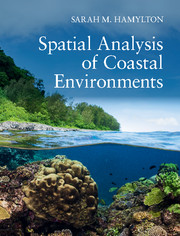Book contents
- Spatial Analysis of Coastal Environments
- Reviews
- Spatial Analysis of Coastal Environments
- Copyright page
- Dedication
- Contents
- Foreword
- Preface
- Acknowledgements
- 1 The Application of Spatial Analysis to Coastal Environments
- 2 The Nature of Spatial Data
- 3 Basic Geographical Analysis With Spatial Information in Coastal Environments
- 4 Mapping Coastal Environments
- 5 Monitoring Coastal Environments
- 6 Geostatistical Analysis of Coastal Environments
- 7 Modelling Coastal Environments
- 8 Addressing Uncertainty in the Spatial Analysis of Coastal Environments
- 9 Communicating and Incorporating the Results of Spatial Analysis Successfully
- Glossary
- References
- Index
1 - The Application of Spatial Analysis to Coastal Environments
Published online by Cambridge University Press: 04 May 2017
- Spatial Analysis of Coastal Environments
- Reviews
- Spatial Analysis of Coastal Environments
- Copyright page
- Dedication
- Contents
- Foreword
- Preface
- Acknowledgements
- 1 The Application of Spatial Analysis to Coastal Environments
- 2 The Nature of Spatial Data
- 3 Basic Geographical Analysis With Spatial Information in Coastal Environments
- 4 Mapping Coastal Environments
- 5 Monitoring Coastal Environments
- 6 Geostatistical Analysis of Coastal Environments
- 7 Modelling Coastal Environments
- 8 Addressing Uncertainty in the Spatial Analysis of Coastal Environments
- 9 Communicating and Incorporating the Results of Spatial Analysis Successfully
- Glossary
- References
- Index
Summary
Information
- Type
- Chapter
- Information
- Spatial Analysis of Coastal Environments , pp. 1 - 30Publisher: Cambridge University PressPrint publication year: 2017
